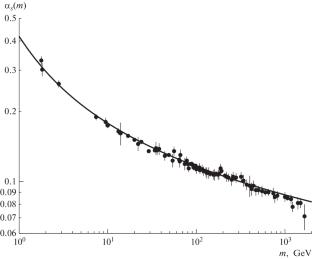Masses of 92 \({1s}\)-Hadrons in Chiral-Invariant Phase Space Model
IF 0.4
4区 物理与天体物理
Q4 PHYSICS, NUCLEAR
引用次数: 0
Abstract
In the Chiral-Invariant Phase Space Model constituent quarks of hadrons are embedded in nonperturbative vacuum with a boiling temperature \(T_{c}\). The color-electric binding energy is proportional to the reduced energy of quarks. The mean spin products for the color-magnetic shifts are calculated according to the simplified para-statistics rules. The 61 hadron masses are fitted by 8 parameters, including \(T_{c}\) and 5 quark masses. Masses of the 21 hadrons including double and triple heavy baryons are predicted.

92个质量\({1s}\) -手性不变相空间模型中的强子
在手性不变相空间模型中,强子的组成夸克嵌入在具有沸腾温度的非微扰真空中\(T_{c}\)。色电结合能与夸克的还原能成正比。根据简化的准统计规则计算了色磁位移的平均自旋积。61个强子质量被8个参数拟合,包括\(T_{c}\)和5个夸克质量。预测了21个强子的质量,包括双重子和三重子。
本文章由计算机程序翻译,如有差异,请以英文原文为准。
求助全文
约1分钟内获得全文
求助全文
来源期刊

Physics of Atomic Nuclei
物理-物理:核物理
CiteScore
0.60
自引率
25.00%
发文量
56
审稿时长
3-6 weeks
期刊介绍:
Physics of Atomic Nuclei is a journal that covers experimental and theoretical studies of nuclear physics: nuclear structure, spectra, and properties; radiation, fission, and nuclear reactions induced by photons, leptons, hadrons, and nuclei; fundamental interactions and symmetries; hadrons (with light, strange, charm, and bottom quarks); particle collisions at high and superhigh energies; gauge and unified quantum field theories, quark models, supersymmetry and supergravity, astrophysics and cosmology.
 求助内容:
求助内容: 应助结果提醒方式:
应助结果提醒方式:


